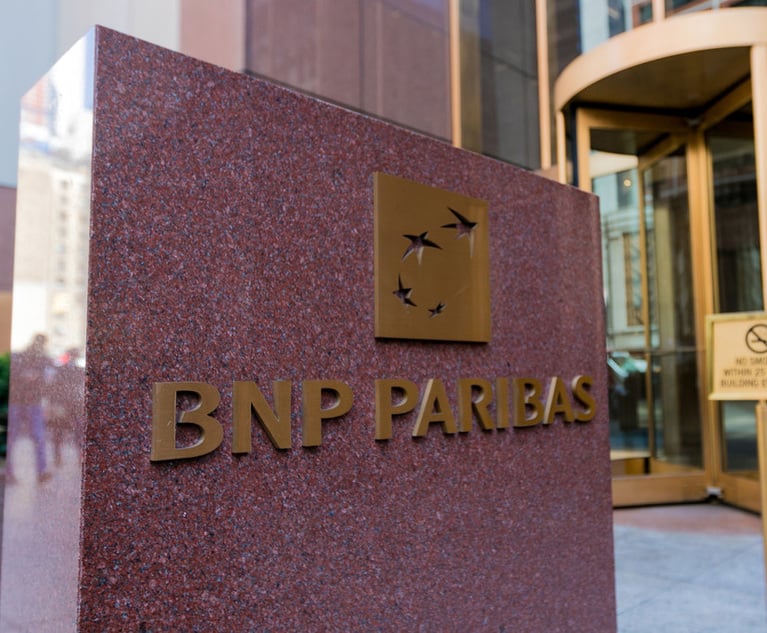 Credit: iLee/Adobe Stock
Credit: iLee/Adobe Stock Bankers Beware: The Judicial Divide Over Customary Investment Banking Fees
Over the past few decades, a deep split has developed between New York's state and federal courts over the enforceability of fee provisions incorporating general commercial practice. The First Department has upheld them, but federal judges in the Southern District have invalidated them as unenforceable "agreements to agree."
November 14, 2022 at 08:30 AM
8 minute read
New York is the heart of the capital markets. Companies rely on placement agents, brokers, and investment bankers to help them raise capital for a success fee, which is often a percentage of the capital raised. But negotiating a clear-cut fee can be challenging. Capital can be raised in many different forms (debt or equity, short term or long term, active or passive) and the ultimate form of the deal may be unforeseeable. Fee provisions can remain in effect for several years, the so-called "tail" period, during which market conditions can dramatically change. As a result, investment banking agreements sometimes provide for a customary or market-based fee—for example, a fee "consistent with investment industry practice."
Over the past few decades, a deep split has developed between New York's state and federal courts over the enforceability of fee provisions incorporating general commercial practice. The First Department has upheld them, but federal judges in the Southern District have invalidated them as unenforceable "agreements to agree." Below, we explain this divide among the New York courts. We also suggest that the divide is driven by a difference in the courts' willingness to allow contracting parties to punt on a material term.
This content has been archived. It is available through our partners, LexisNexis® and Bloomberg Law.
To view this content, please continue to their sites.
Not a Lexis Subscriber?
Subscribe Now
Not a Bloomberg Law Subscriber?
Subscribe Now
NOT FOR REPRINT
© 2025 ALM Global, LLC, All Rights Reserved. Request academic re-use from www.copyright.com. All other uses, submit a request to [email protected]. For more information visit Asset & Logo Licensing.
You Might Like
View All
'Merciless' Filing Deadline Dooms Cuban Americans' Property-Trafficking Suit Against BNP Paribas, SocGen
4 minute read
After 2024's Regulatory Tsunami, Financial Services Firms Hope Storm Clouds Break


Trump Mulls Big Changes to Banking Regulation, Unsettling the Industry
Law Firms Mentioned
Trending Stories
Who Got The Work
Michael G. Bongiorno, Andrew Scott Dulberg and Elizabeth E. Driscoll from Wilmer Cutler Pickering Hale and Dorr have stepped in to represent Symbotic Inc., an A.I.-enabled technology platform that focuses on increasing supply chain efficiency, and other defendants in a pending shareholder derivative lawsuit. The case, filed Oct. 2 in Massachusetts District Court by the Brown Law Firm on behalf of Stephen Austen, accuses certain officers and directors of misleading investors in regard to Symbotic's potential for margin growth by failing to disclose that the company was not equipped to timely deploy its systems or manage expenses through project delays. The case, assigned to U.S. District Judge Nathaniel M. Gorton, is 1:24-cv-12522, Austen v. Cohen et al.
Who Got The Work
Edmund Polubinski and Marie Killmond of Davis Polk & Wardwell have entered appearances for data platform software development company MongoDB and other defendants in a pending shareholder derivative lawsuit. The action, filed Oct. 7 in New York Southern District Court by the Brown Law Firm, accuses the company's directors and/or officers of falsely expressing confidence in the company’s restructuring of its sales incentive plan and downplaying the severity of decreases in its upfront commitments. The case is 1:24-cv-07594, Roy v. Ittycheria et al.
Who Got The Work
Amy O. Bruchs and Kurt F. Ellison of Michael Best & Friedrich have entered appearances for Epic Systems Corp. in a pending employment discrimination lawsuit. The suit was filed Sept. 7 in Wisconsin Western District Court by Levine Eisberner LLC and Siri & Glimstad on behalf of a project manager who claims that he was wrongfully terminated after applying for a religious exemption to the defendant's COVID-19 vaccine mandate. The case, assigned to U.S. Magistrate Judge Anita Marie Boor, is 3:24-cv-00630, Secker, Nathan v. Epic Systems Corporation.
Who Got The Work
David X. Sullivan, Thomas J. Finn and Gregory A. Hall from McCarter & English have entered appearances for Sunrun Installation Services in a pending civil rights lawsuit. The complaint was filed Sept. 4 in Connecticut District Court by attorney Robert M. Berke on behalf of former employee George Edward Steins, who was arrested and charged with employing an unregistered home improvement salesperson. The complaint alleges that had Sunrun informed the Connecticut Department of Consumer Protection that the plaintiff's employment had ended in 2017 and that he no longer held Sunrun's home improvement contractor license, he would not have been hit with charges, which were dismissed in May 2024. The case, assigned to U.S. District Judge Jeffrey A. Meyer, is 3:24-cv-01423, Steins v. Sunrun, Inc. et al.
Who Got The Work
Greenberg Traurig shareholder Joshua L. Raskin has entered an appearance for boohoo.com UK Ltd. in a pending patent infringement lawsuit. The suit, filed Sept. 3 in Texas Eastern District Court by Rozier Hardt McDonough on behalf of Alto Dynamics, asserts five patents related to an online shopping platform. The case, assigned to U.S. District Judge Rodney Gilstrap, is 2:24-cv-00719, Alto Dynamics, LLC v. boohoo.com UK Limited.
Featured Firms
Law Offices of Gary Martin Hays & Associates, P.C.
(470) 294-1674
Law Offices of Mark E. Salomone
(857) 444-6468
Smith & Hassler
(713) 739-1250






